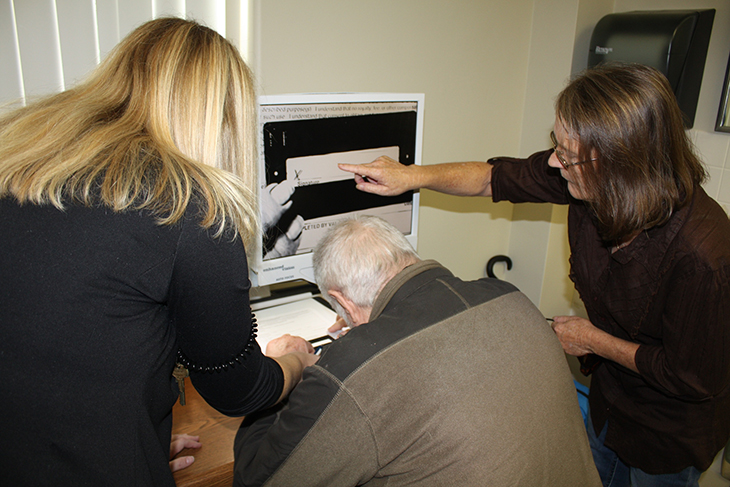The following story is from the John J. Pershing VA Medical Center. The full story is available here.
Sgt. 1st. Class Kenneth James Cline is a bona fide hero, the kind people wave American flags for and parents point out to their children during parades.

But these days, Cline can’t see the flags or the children in parades. In 2004, he was declared legally blind, and also suffered a couple of strokes that impacted his health so much that he engaged in a two-year battle just learning to walk and talk again. It was a struggle merely relearning to feed himself, though his wife, Janet, was there by his side the whole time.
The decrease in his quality of life began to impact his outlook and depression soon set in. Even the tiniest details of daily living could be overwhelming.
Erin Hullinger, a social worker with the John J. Pershing VA Medical Center’s Visual Impairment Services Team (VIST), contacted Cline to offer assistance.
“Erin helped with sticky dots to put on things, so I could tell the difference between say: ice and water on the fridge,” Mr. Cline says. “She gave me something to put on my plate to keep food from sliding off and a gadget to tell me when my coffee cup was filling up, so I’d know when to stop.”
It’s the little things, Cline says, citing an example of shirts with no tags. “You can’t tell front from back when you’re getting dressed.” Hullinger helped with some puff paint on the inside back, so Cline could feel the difference. She also provided a talking watch, so he would not have to depend on others to tell him the time.
Hullinger also arranged for him to visit the VA St. Louis Health Care System’s Intermediate Low Vision Clinic.
“They spent hours with me, testing my vision. They found out my right eye is stronger than my left, which was the opposite of what I had thought.”
The clinicians provided Cline with six pairs of glasses, designed for different tasks. “It was great,” he says, “I never imagined yellow glasses would help so much.”

Cline hugs VA Social Worker Erin Hullinger for her efforts in helping him regain his quality of life.
And then came, “The Viewer.” A close-circuit television device magnifies objects and papers for Cline to be able to see or read them. The video magnifier uses a stand-mounted or handheld video camera to project a magnified image onto a video monitor, a television screen or a computer monitor.
The device has made a big difference for Mr. Cline. “It makes everything so much clearer,” he says. “The best part is I can see pictures of my grandkids and great-grandkids for the first time.”
VA’s Blind Rehabilitation Service also offers various types of programs and services for Veterans who are visually impaired. Services can address such skill areas as independent living, computer access training, visual skills, orientation and mobility, communication skills, and recreational activities. Visit http://www.rehab.va.gov/blindrehab/ for more information.

Topics in this story
More Stories
Bob Jesse Award celebrates the achievements of a VA employee and a team or department that exemplifies innovative practices within VA.
The Medical Foster Home program offers Veterans an alternative to nursing homes.
Watch the Under Secretary for Health and a panel of experts discuss VA Health Connect tele-emergency care.







